August 1 Nationwide Protest Against High Cost of Living
Government’s Desperate Attempts to Suppress the Movement Fails
We Demand the Immediate release of all Arrested Protesters
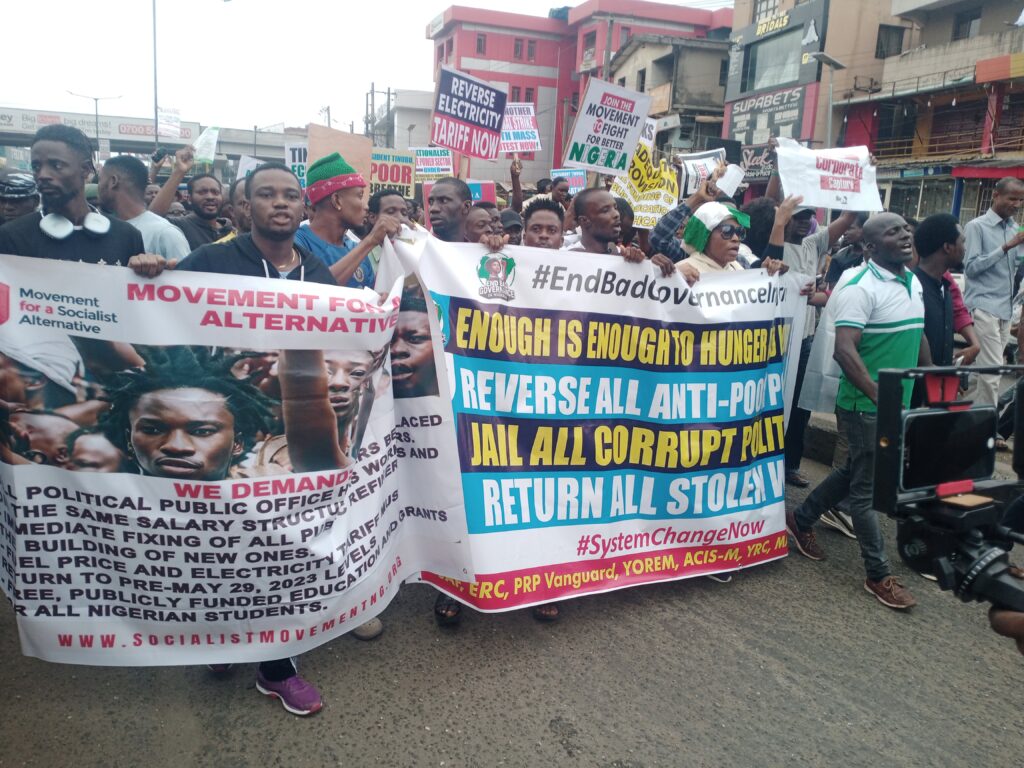
On August 1, 2024, Nigerians took to the streets to protest against the high cost of living brought about by the Tinubu administration’s corrupt capitalist policies. For weeks leading up to the protest, social media buzzed with calls to challenge the economic hardships. Despite government efforts to intimidate the masses using religious leaders, traditional rulers, security agencies, thugs, and a last-minute court injunction, the protest was notably successful in many states.
In an embarrassing series of meetings, the government enlisted traditional rulers, religious leaders, traders, and some youth to dissuade citizens from participating in the protests. The protest, tagged #EndBadGovernanceInNigeria, drew inspiration from recent protests in Kenya and saw youths across Nigeria determined to effect positive change.
Since President Tinubu assumed office in May 2023, the regime’s neoliberal capitalist policies, including a 200% increase in petrol prices and the devaluation of the naira, have worsened the economic hardship in Nigeria. The government continues to spend extravagantly on non-essential items, such as a N2.17 trillion supplementary budget in November 2023, which included N28 billion for new bulletproof cars for the President and his wife, and N12.5 billion for the presidential air fleet. This lavish spending continues despite the dire living conditions of ordinary Nigerians.
Nigeria is experiencing its worst inflation in decades. According to the National Bureau of Statistics, the country’s inflation rate stands at 34.19%, with food inflation at 40.66%. Analysts doubt these figures, considering the significant rise in market prices.
Massive Compliance and Bold Demonstrations on Day One
The first day of the protest saw massive compliance from the Nigerian people. Most offices were closed, and street traders and marketplaces were deserted. In Lagos, the protest began in Ikeja and ended in Ojota, covering about 10 kilometres with approximately a thousand participants. The Nigeria people defied the government’s restrictive court injunction, which limited protests to just two locations in Lagos.
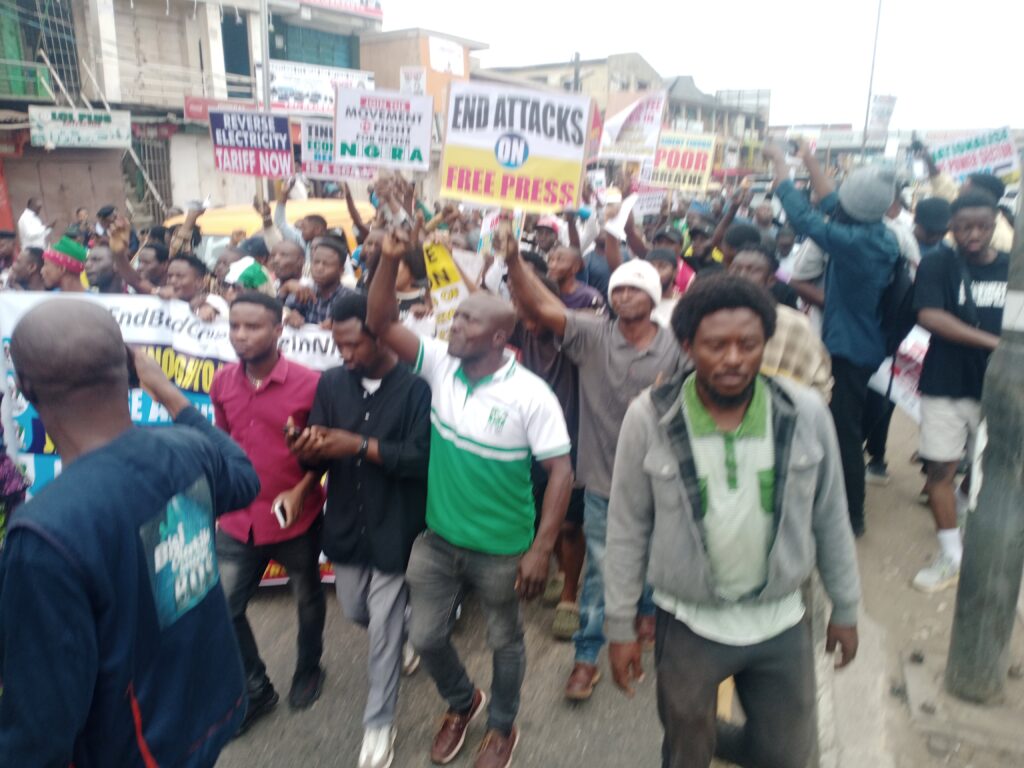
There were also protesters at the lekki toll gate, the converge venue of the #EndSARS protest in 2020 where the government open fire on the innocent citizens. This time the police dispersed the protesters there with force and tear gassed. Similar instance was experienced in other part of the country, in Abuja there were mass people who trooped out to join the protest. Despite the brutish and aggressive method by the police, people from other states like in kano, Kaduna, Zamfara, Rivers and other places used the protest to showed their frustrations on the severe economic challenges ravaging the country.
The protesters’ demands included the reversal of the fuel price hike to pre-May 2023 levels, a rollback of the electricity tariff increase, the release of those arrested during the #EndSARS protests, fair wages for workers, and the functioning of the country’s refineries. The widespread participation demonstrated a strong desire for change and a rejection of the current economic policies.
While the protest recorded significant success, some areas experienced disruptions due to police actions. In Abuja, the police used tear gas to disperse protesters, and in Suleja, police shot and killed one protester. Major cities were heavily occupied by police and secret service agents, showcasing the government’s attempts to stifle the movement. Despite these efforts, the protesters remained resilient, highlighting the widespread dissatisfaction with the current economic policies.
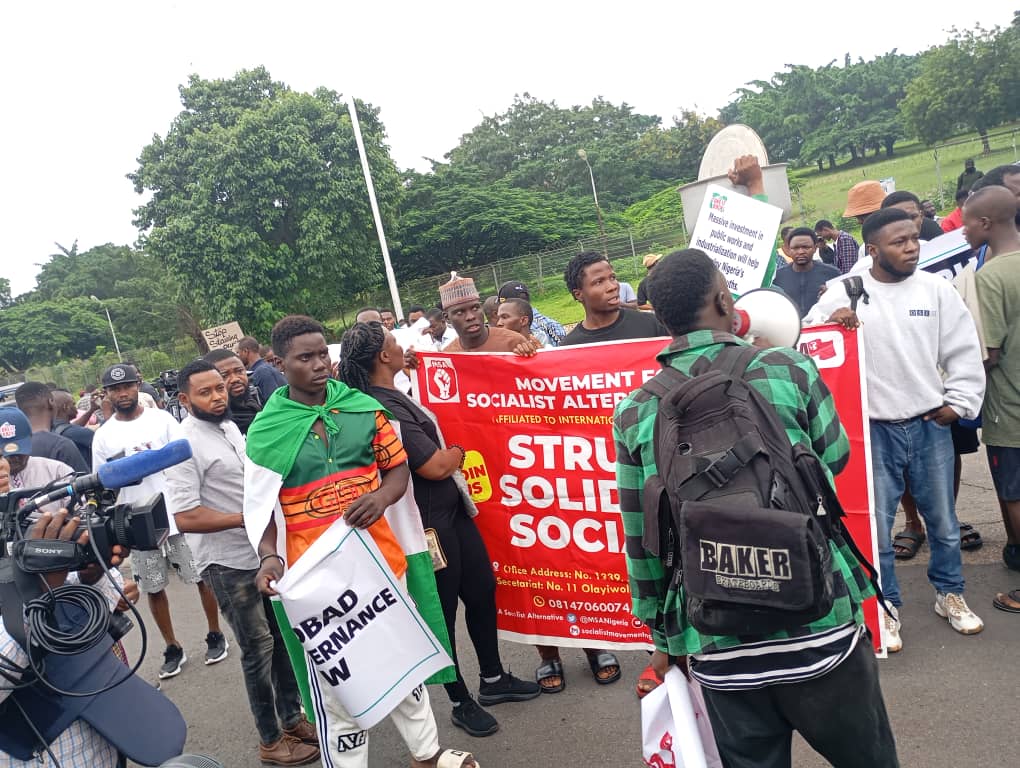
Hunger and Government Policies Driving Mass Protests
The government’s anti-people policies have turned Nigeria into the poverty capital of the world and the country with the highest number of out-of-school children globally. An alarming 10.5 million children aged 5-14 years are not in school—meaning one in every five of the world’s out-of-school children is in Nigeria, according to UNICEF (www.unicef.org/nigeria/education).
The ruling elites have persistently neglected the nation’s critical social needs, leading to a generation of young people deprived of quality education and basic opportunities. The situation is particularly dire in the northern part of the country, where the elites exploit this crisis for their electioneering gains, rather than addressing the root causes of poverty and underdevelopment. This neglect has fueled widespread anger and mobilized people across the country to protest against the government’s failure to meet the needs of its citizens.
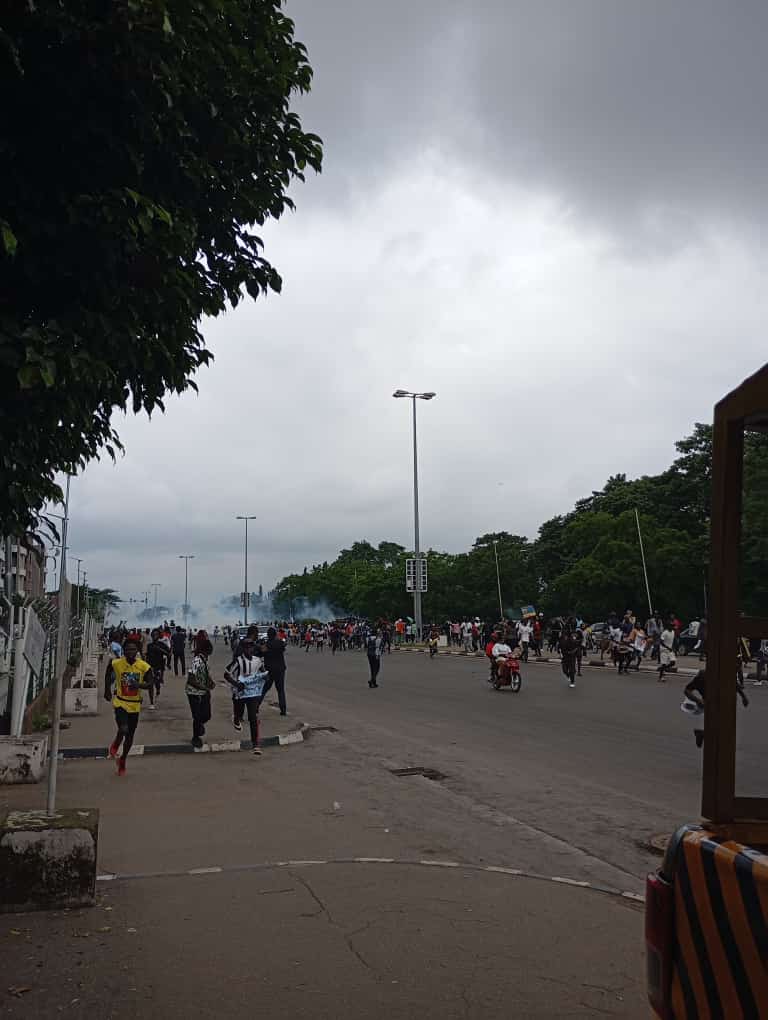
In the following days, the protests continued, with people across the country demanding good governance. As the protests gained popularity, the Tinubu regime began clamping down on innocent protesters, arresting many and using live ammunition. Activists like Babatunde Oluajo, Michael Lenin and some others were picked up by security agencies overnight to demoralize the protest.
President Tinubu’s TV Address
In a televised address after the first three days of protests, President Tinubu failed to address the fundamental issues raised by the protesters. Instead, he reiterated promises made during his campaign. the president remained silent on critical issues such as reversing the increase in petrol prices and ensuring the operationalization of the country’s refineries. These refineries, which were promised to begin production this year, were not mentioned in his speech. Additionally, the president did not address the demand for reductions in the extravagant allowances and expenditures of political officeholders.
Instead, the president’s address was filled with vague promises that appeared unlikely to materialize, echoing past unfulfilled assurances. Furthermore, the president attempted to deflect attention from the federal government’s responsibilities by highlighting that state governors are receiving substantial allocations from the Federation Accounts Allocation Committee (FAAC). This diversionary tactic fails to address the immediate concerns of the populace and does not provide a credible solution to the pressing issues of economic hardship and governance.
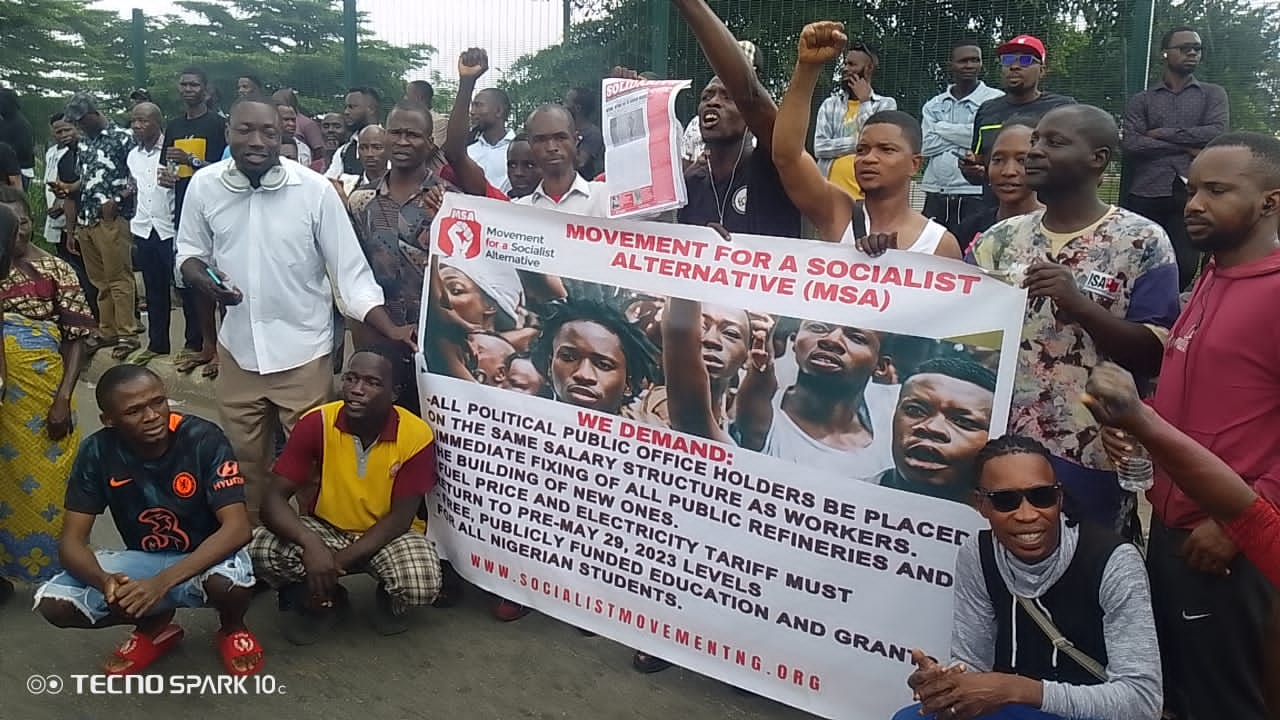
Condemnation of the Arrest of Activists and Protesters
The Tinubu regime, barely a year and two months into office, has increasingly resorted to undemocratic tactics by arresting activists and protesters. This heavy-handed approach was evident during the preparations for the June 12 protest, where the government, through the Department of State Services (DSS), arrested Juwon, a key organizer, and detained him for days without charge. Unfortunately, this pattern of repression has continued under the current administration.
In the recent ten-day protest, over a hundred people were arrested, and many remain in custody without being formally charged. The police, the office of the National Security Adviser, and the DSS have all been involved in these arbitrary detentions, undermining the fundamental rights of citizens to peacefully express dissent.
One of the most alarming incidents was the police’s pre-dawn invasion of the Nigeria Labour Congress (NLC) headquarters in Abuja, a clear attempt to intimidate and suppress legitimate protest. Similar crackdowns occurred across the country, with notable arrests in Ondo State, where AAC gubernatorial candidate Ajayi Wiseman was detained alongside other protesters, and in Kaduna, Kano, and other parts of the North, where mass arrests were carried out by security agencies.
These actions are a blatant violation of democratic principles and must be condemned. The government’s suppression of dissent not only stifles free speech but also erodes the very foundation of democracy in Nigeria.
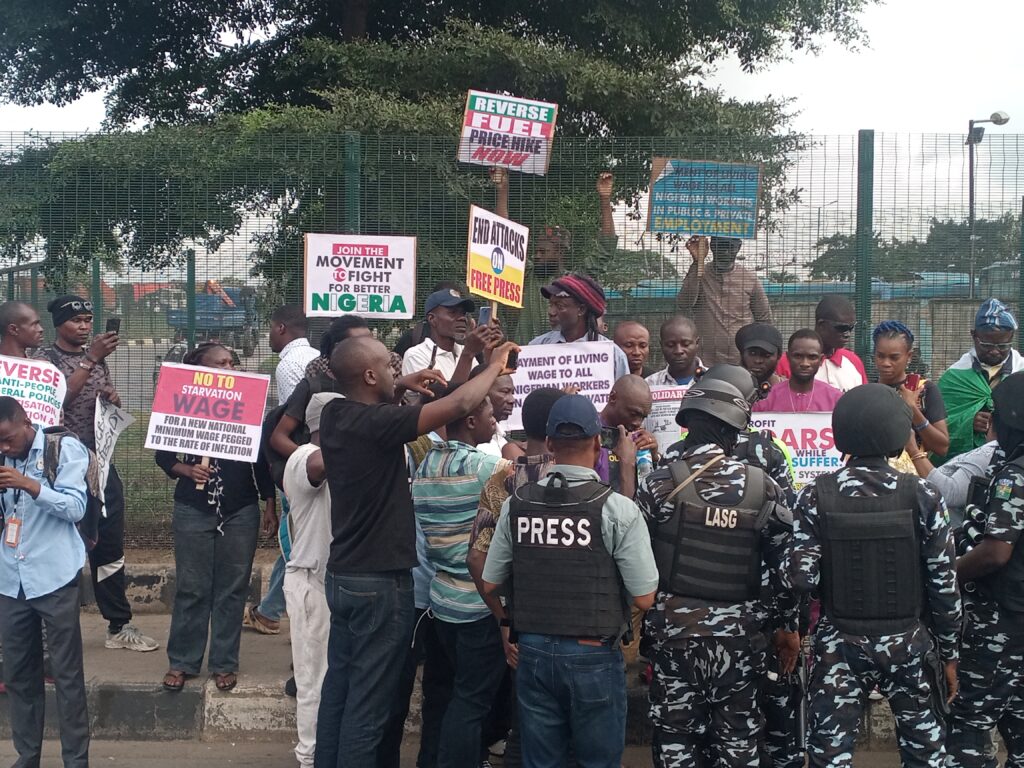
Call to Action for Labour Unions
While the government has signed a new minimum wage into law, there are doubts about its implementation by state governors. The Nigerian Labour Congress (NLC) and the Trade Union Congress (TUC) must prepare for further challenges and struggle against anti-worker policies. The devaluation and price hikes will erode the gains made by the new N70,000 monthly wage. This is why we have consistently advocated for the building of a political party that represents the interests of the working class, grounded in socialist principles. Such a party would serve as a crucial vehicle for attaining political power and enacting policies that prioritize workers’ needs.
A key aspect of our vision includes the nationalization of major sectors of the economy, with the aim of placing them under democratic workers’ management and control. This approach ensures that critical industries and resources are managed in a way that benefits the broader population, rather than being exploited for private gain. By implementing these policies, we aim to create an economy that is truly responsive to the needs of the working people, fostering a fairer and more equitable society.
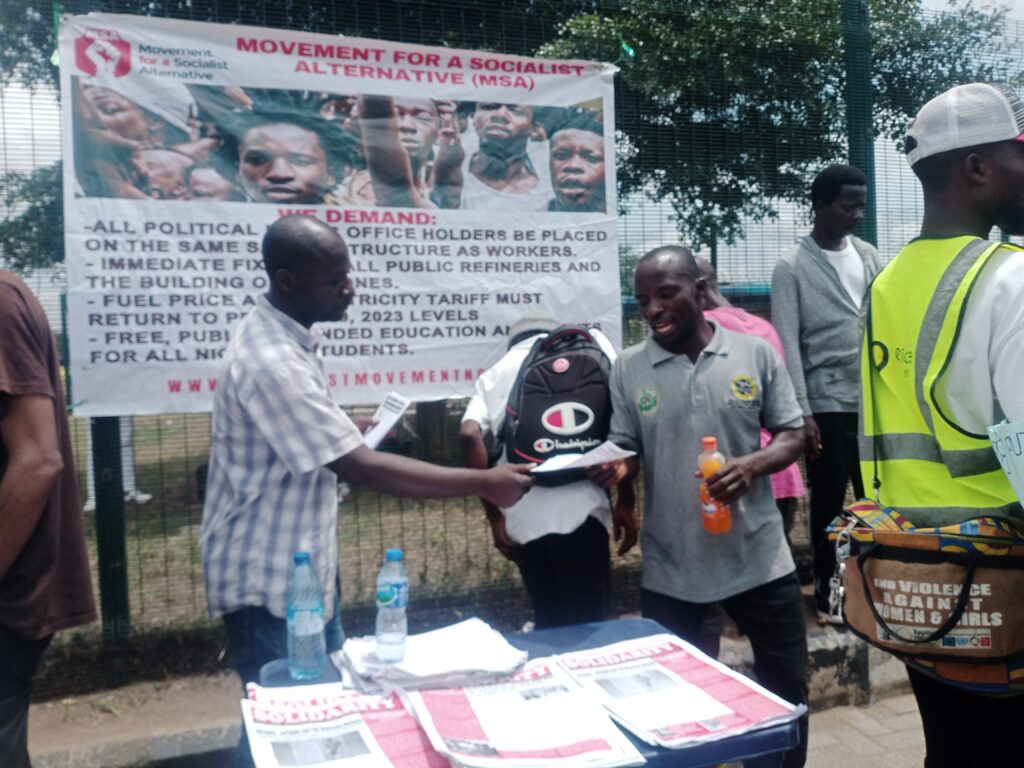
The Movement for a Socialist Alternative (MSA) condemns the use of force against peaceful protesters and stands in solidarity with those affected by police brutality. We call on the Labour leadership to support the protest and ensure that workers’ welfare is protected. All Nigerians must unite in the fight against bad governance and economic hardship. The struggle for a better Nigeria is far from over, and unity is essential in demanding equity and improved living conditions for all.
